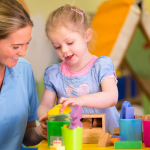All Party Group on Early Learning and Childcare hears from the Stronger from the Start Alliance and about childcare for children with additional needs
The All Party Group on Early Education and Childcare, held its latest meeting today via Zoom (Thursday 27 June). The meeting was attended online by over 40 people, including elected representatives, senior departmental officials and a wide range of stakeholders representing early education and childcare, the women’s sector, business, parents’ organisations and more.
The meeting received an update on action points from, and developments since, the last full meeting of the Group. This included the All Party Group’s AGM having taken place on 24th May when the following officers were elected:
- Chair: Nicola Brogan, MLA (Sinn Féin)
- Vice chair: Diane Dodds, MLA (DUP)
- Secretary: Sinead McLaughlin, MLA (SDLP)
- Treasurer: Kate Nicholl, MLA (Alliance).
Update from Department of Education
The meeting began with an update from Tina Dempster, Department of Education on the £25 million package of measures for early learning and childcare announced by the Education Minister in May.
The package of support, for the 2024-25 financial year, incorporates measures including:
- stabilisation and enhanced support for existing early years and childcare programmes
- commencement of the standardisation of the pre-school education programme
- a Northern Ireland Childcare Subsidy Scheme that will provide a 15% reduction on childcare bills for eligible working parents who have a child under school age
- a data collection piece.
While there is still operational detail to be worked out, the Department of Education (DE) is preparing a ‘Frequently Asked Questions (FAQs)’ document which it is hoped will be published within the next week, and will answer many of the questions parents and childcare providers may have. DE is working with the Department of Health on the data collection exercise and NISRA will be issuing a survey for parents in the autumn. On pre-school standardisation, the Department is working with the Education Authority towards some providers who are currently offering part-time pre-school places being able to transition to 22.5 hours in September 2025. The package announced by the Minister allocated £5 million to begin the transition process with 2,200 additional full-time places expected to be in place by September 2025.
Stakeholders asked a number of questions in relation to:
- funding for registered childminders
- planning for pilot programmes and the inclusion of the needs of deaf children and children with disabilities
- how providers can register to offer funded pre-school provision
- when parents will know which providers will be offering the full-time places.
Update from Department of Health
Aoife Hamilton, Employers For Childcare (secretariat) shared an update from Marc Bailie, Department of Health, on the Review of Minimum Standards for Childminding and Day Care. The new Health Minister has been briefed on the Review, and it is intended that the consultation on ratios and health assessments will be launched during the week commencing Monday 8 July. This is in keeping with the pre-election Purdah Guidance currently in place. It is envisaged that the consultation will run for a full 12 weeks. Once the consultation has been launched, the Department will begin the process of formally appointing people to the review Reference Group.
Presentation from the Stronger from the Start Alliance
Fiona Cole (Barnardo’s), Sheena McMullen (Action for Children) and Caroline Cunningham (NSPCC) gave a presentation from the Stronger from the Start Alliance. This is a group of more than 60 organisations from the community and voluntary sector in Northern Ireland working together to promote and improve infant mental health. They gave an introduction to the Stronger from the Start collective and presented on why infant mental health is important to the development of a future early education and childcare strategy.
Fiona set out the costs of late intervention – around £536 million in Northern Ireland – equating to £1,166 per child. She introduced the wide range of organisations who have come together to be part of the Alliance with the objective of amplifying the importance of infant mental health.
Caroline explained what is meant by infant mental health, and why it is so important for the social and emotional wellbeing and development of children, and is strongly linked to later outcomes in life. She referred to robust research carried out by the Nuffield Foundation that highlighted the contributory, causal relationship between household poverty and children’s wellbeing, including the risk that they will experience abuse or neglect. It focused on the importance of effective government policies both to address poverty and to support families and parents – and high-quality, affordable childcare is a key part of this.
Sheena gave an overview of the Stronger from the Start Alliance’s Manifesto, explaining four key asks in relation to:
- leadership and collaboration
- improving evidence and policy
- workforce development
- service development.
Sheena set out the case for embedding infant mental health into the new early learning and childcare strategy referring to research that demonstrates the economic, health and developmental rationale for investing in early intervention. She discussed how this can be done including through preventative policy making, a whole-system approach for 0-5s, joined-up planning and the development of a comprehensive workforce strategy. Critically, early learning and childcare settings need to be recognised as a key part of integrated family support services and integral to public service infrastructure.
Fiona concluded the presentation by setting out key asks for members and stakeholders of the All Party Group including looking for opportunities to put infants and babies at the heart of planning, and to prioritise funding for early intervention.
Presentation from Sólás
Joan Henderson, Managing Director of Sólás, a charity supporting children and young people gave a presentation focusing on SEN childcare for children with additional needs. Joan advocated strongly for the establishment of two sub-groups: one to address the barriers experienced by children with SEN at a strategic level; and one to action a pilot study aiming to understand and overcome the operational challenges of delivering SEN childcare.
Strategic barriers include:
- issues with the Minimum Standards which currently do not accommodate children with a disability
- staff skills and training requirements
- financial costs associated with higher staffing and the cost of delivering a quality service
- transport to the childcare facility.
Joan gave practical insight into how pilots could be delivered to be most effective, and set out a provisional timeline for implementation.
Conclusion
During the question and discussion session following both presentations a number of points were raised in relation to:
- ensuring older children with a disability are not forgotten in childcare provision, and that this needs to be reflected in the review of the minimum standards
- the Department of Education end-to-end Review of SEN
- best practice in relation to the integration of infant mental health into early learning and childcare policies elsewhere.
Both presentations delivered at the All Party Group are available to download at the top of this page.
Looking ahead to the next meeting of the All Party Group, it is planned that this will be an in-person meeting in September at Stormont. Details will be circulated in due course.
Find out more about the All Party Group on Early Education and Childcare
Further information on the All Party Group on Early Education and Childcare, including links to read more about previous meetings, is available here.
Employers For Childcare provides the Secretariat for the All Party Group on Early Education and Childcare – correspondence to strategy@employersforchildcare.org.






